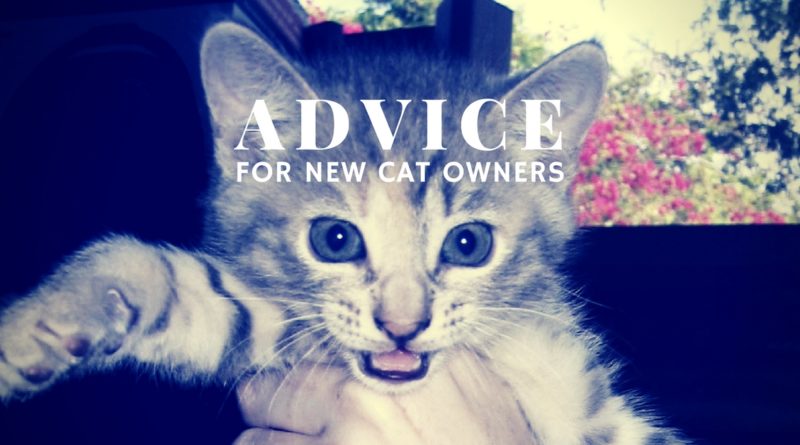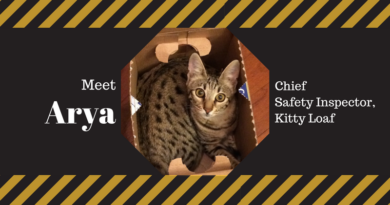Advice for New Cat Owners
Bringing home a new kitten can be a very exciting and stressful time. Even veteran cat owners can get a bit overwhelmed. It’s easy to get caught up in all the kitten cuteness and forget to do some pretty basic things that would otherwise make your life so much easier once your cat gets older.
From experience, here is some advice for new cat owners.
#1 – Use a toy, not your hands

Kittens are adorable furry balls of playful energy. When they aren’t sleeping they are playing. Everything is a toy to them. Fingers and toes are by far the most fascinating toys for kittens. Resist the urge to play with your kitten using your hands (or any part of your body). It might be cute and harmless now, but when they get older, you will not find their behavior so cute.
Dog people are particularly prone to playing with cats inappropriately. For a dog, it is harmless to rough-house with them, pet them vigorously, or roll them around on the ground with your hand. Dog people who aren’t used to being around cats will often try to do the same things with cats. Do not let them. You don’t want to train your cat to approach any human from a defensive standpoint.
Train everyone in your family that the proper way to play with a kitten is by using a toy. Make sure everyone is on the same page. It only takes a single person not following these instructions to confuse your kitten into thinking it is ok to bite fingers.
#2 – Get them used to Touch
If you want your kitten to turn into a lovable cuddly lap cat, make sure you get them used to being touched and held when they are young. As we mentioned above, all forms of touch should build positive associations. Give them treats on your lap. Pet them while they are eating. Hold them for a few seconds and set them back down before they get wrestles. Gradually increase the time you hold them, but never let them jump from your arms. Always set them down before they’ve had enough.
Touch their paws and rub them gently. When they get bigger you will have to clip their nails, and most cats do not like it when people touch their paws. Start young and desensitize them to paw touching so you won’t have a hard time in the future. At some point or another you’ll probably have to give your cat a pill or flea medicine. This can either be easy or a huge pain in the butt depending on how well you trained your kitten to accept your touch.
#3 – Train your cat to follow a routine, don’t let your cat train you
Cats are creatures of habit. If you want to stress out your cat, simply screw up their routine. (we don’t recommend this) When they are young, set a good routine and stick with it. A good routine would look something like this:
Morning: Wake up, get your coffee, have breakfast, THEN dedicate at least 15 minutes to your cat. Get out their favorite wand toy and play with them until they’re tired. Playtime should be followed by breakfast. In the wild, cats don’t get to eat until they’ve hunted and caught their prey. This is the behavior you want to mimic.
Evening: Come home from work, relax, THEN dedicate at least 15 minutes to your cat. Get out the wand toys, laser pointer, and catnip. Really get them moving around and exerting themselves. Then feed them dinner.
That sounds simple, but there are a few common mistakes that people tend to make.
Pitfall #1: Feeding your cat first thing in the morning or as soon as you get home
This might seem like a practical routine, but here’s where it becomes a problem. If your cat learns to associate you waking up with them getting food, they will try to wake you up earlier, and earlier. Then there’s daylight savings time and the weekend and days when you just want to sleep in but your cat won’t let you. Don’t go down this sleepless path. Take our advice and don’t feed your cat immediately after you wake up, no matter what.
Pitfall #2: Not playing with your cat enough
Cats have lots of energy and when they are locked up in the house all day, they rely on you for entertainment. Just buying them a few catnip toys and leaving them around the house is not sufficient. You actually have to get them moving. Cats are also nocturnal creatures by nature. But that doesn’t mean you can’t alter their sleeping routine. Having daily play routines will ensure your cat gets worn out during the day, which will hopefully allow them to sleep more at night.
Pitfall #3: Feeding them every time they meow
Make sure you’re the one who determines when your cat eats and not the other way around. Cats will learn pretty early on that meowing gets your attention. When your cat sits by their food dish and meows at all hours, they aren’t starving, they are trying to train you to feed them. If you give in to this behavior, be prepared to pay the consequences. If your cat learns that Meow = Food, you’re in for trouble. And your kitten could become another victim of feline obesity, which makes them prone to a number of serious health risks. Fixing this bad behavior is way more difficult than never letting it start to begin with.
#4 – A social cat is a happy cat
Having a social, non-scaredy cat has many advantages. Socialized cats are less likely to run away from home. They’re more confident and more fun to be around. They’re less likely to have behavioral or stress-related health problems.
The best time to socialize your cat is when they are still kittens. As you begin to form a relationship with your kitten, try introducing them to your friends and family members. Instruct your visitors how to play with your kitten (not using their hands) and provide them with treats to give to your kitten. If all goes well, your kitten will start to associate strangers with positive things rather than fear.
It’s also a good idea to introduce them to loud noises like the washing machine and vacuum cleaner when they are kittens. You can desensitize kittens to loud noises by feeding them or giving them treats while your household appliances are running.




